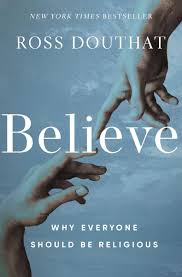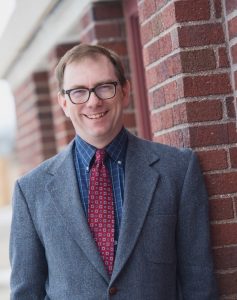“The immortality of the soul is something of such vital importance to us, affecting us so deeply, that one must have lost all feeling not to care about knowing the facts of the matter…. Thus our chief interest and chief duty is to seek enlightenment on this subject, on which all our conduct depends. And that is why, amongst those who are not convinced, I make an absolute distinction between those who strive with all their might to learn and those who live without troubling themselves or thinking about it.”
–Pascal, Pense 427
“Seek ye first the kingdom of God, and his righteousness; and all these things will be added unto you.” So says Jesus in the Gospel of Matthew (6:33). Charles Taylor argues that religious belief in the Secular Age is best described as a quest. Belief is a journey rather than a destination. Perhaps it is no accident, then, that so much of the youth literature of the twenty-first century has this quality. The Harry Potter, Hunger Games, Divergent, Percy Jackson, and Maze Runner series all have a strong element of quest in them. Ours is not an age of belief, but an age of uncertainty.
Consider the distinction between such uncertainty and Tevye in Fiddler on the Roof. Tevye tells us early in the play and film that the Jews of Anatevka “know who they are and what God wants them to do” because they are guided by traditions. Among those traditions are daily prayers, keeping the head covered, and the wearing of the prayer shawl. Where did these traditions come from? “I don’t know,” Tevye confesses. But they provide certainty in a life whose precariousness is compared to fiddling on the roof.
The so-called secularization thesis holds that when nations progress (usually defined as increased wealth and education), they leave their religion, their superstitions behind. We like to pat ourselves on the back regarding our commitment to science and reason, relegating religion to the benighted past. Taylor, though, proposes this as a mere “supersessionist narrative.” It is a story we tell ourselves—“spin” rather than the truth—to encourage us in the belief of the inevitable victory of “reason” over “faith.”
Ross Douthat’s outstanding new book, Believe, is in harmony with Taylor in attempting to pop this bubble. I encourage readers to peruse Ben Christenson’s fine review of the book here at FPR. I wish to add only a couple of additional thoughts. Ben, like many reviewers, draws comparisons between Douthat’s project and that of C.S. Lewis in Mere Christianity. This is an apt comparison. Douthat, more conscious than Lewis of writing in a secular age, does not take any kind of belief for granted. Akin to Pascal, Douthat’s project is to make religious belief plausible to a skeptical audience.
Douthat is likely correct that even the modern secular person has some notion that there is more to this world than meets the eye. The hard atheist is a rare bird. Douthat observes that most people allow for some concept of the supernatural, even if they balk at anything that smacks of “organized religion.” The seemingly miraculous order in the universe and the mystery of human consciousness are two prime pieces of evidence that our existence didn’t just happen accidentally and that there may be immaterial realities. Even in our skeptical age, there are remarkably frequent instances of people experiencing implausible events (unexplained healing, near-death experiences, even broken radios that mysteriously work at the most auspicious moment). Perhaps Hume is wrong that miracles are only experienced by “barbarous” people.
Douthat is convincing that, at minimum, we should dismiss as a prejudice the take of the “Serious Modern Person Who Doesn’t Believe in Magical Nonsense.” While the New Atheism of the early twenty-first century had its day about twenty years ago, it is fairly easy to see that atheism (as opposed to agnosticism) is philosophically and even empirically difficult to square with the facts.
So far, Douthat has presented little to people who have given these matters any kind of serious thought and study. His winsome prose, however, will likely prove compelling to the vast population who have bought into the “Magical Nonsense” subtraction narrative all too easily. Even, perhaps especially, the Certified Smart Person™ should sincerely seek religious answers to life’s biggest questions.
Douthat really shines when explicating the virtues of committing to a religious tradition. The antipathy toward religious institutions is the most prominent reason why people are down on religion in general. We are all familiar with the notion of “spiritual but not religious.” The impression is that organized religion constrains individuality while the history of organized religion is rife with corruption and violence.
Douthat ably rebuts such biases (and yes, these attitudes almost always stem from ignorance). First, Douthat notes that the chances that you are some kind of religious genius are quite small. Religious questions are complex and confounding. At least to start, the wise move is to go with some group that has been thinking over such matters for some time. No one engages in any practice—Douthat suggests field hockey as an example—just making it up as you go. You first look at how other people have practiced the relevant discipline, rightly figuring that the common practice has developed over time because it works. Organized or established religions serve as a kind of spiritual jig, a sort of shorthand to facilitate practice.
In addition, the nature of religious belief and practice is communal. One doesn’t really become an athlete on one’s own. It takes coaching and teammates to develop one’s potential. Douthat notes that twelve-step programs operate in community. Douthat writes that if “you’ve read some books and said some prayers and received nothing revelatory in return, then you’re in the position of someone interested in soccer who refuses to join a team and play consistently. I won’t disbelieve in your sincerity, but I will sincerely doubt your effort.”
Your belief can only be experienced and grown in communion with others. Otherwise, you end up like Chris McCandless, going off into the Alaskan wilderness without any experience or guidance, ending up frozen to death in an abandoned bus. Most likely, it is long-standing religions that offer a truer avenue to the truth than this week’s spiritual fad. In short, the pope is a more reliable spiritual guide than some self-proclaimed guru in San Francisco telling you licking frogs and shoving mushrooms up your nose will bring enlightenment. And unless one simply wants to live as a misanthrope, you will be part of communities that are imperfect. Douthat insightfully notes that any good thing—home, family, freedom—can be misused. We don’t reject them because of their past failures. No more should we reject this or that religious institution, to say nothing of religion in general, because it has participated in some injustice in its past.
There is an emerging consensus, at least in the affluent West, that somehow despite all our material gain, something is missing.
Douthat invokes the character Emeth in C.S. Lewis’s Narnia story The Last Battle. While a devotee of the cult of Tash, in Heaven, the true God, Aslan, tells Emeth that when he acted and sought sincerely, he was really worshiping Aslan. I am not interested in adjudicating that theological claim, but it is in harmony with the general ethos of Douthat’s book. There is an emerging consensus, at least in the affluent West, that somehow despite all our material gain, something is missing. But in our Secular Age, religious belief is highly contested. As stated, we falsely believe that somehow science and reason are starkly distinguishable from faith. Also, the knowledge that there are many alternatives causes us to wonder if any particular religious commitment is necessary.
Douthat is in harmony with Pascal. Peter Kreeft called Pascal the philosopher to modern pagans. Pascal urges the doubtful to seek. “We desire truth and find in ourselves nothing but uncertainty,” he writes in Pensée 401. “We seek happiness and find only wretchedness and death. We are incapable of not desiring truth and happiness and incapable of either certainty or happiness.”
That is why Aslan offers grace to Emeth. Emeth sought the true God sincerely, even if he was mistaken in how exactly to do so. It is asking too much of the modern believer to believe without doubt. To accept without question. To demand certainty in a world constantly in flux. Religious belief just does not rise in the modern world uncontested. Much like in love and marriage, if you are waiting to be dead certain you’ve made the right choice, you will never choose. Douthat encourages his readers to seek with sincerity, to cast our lot with the tradition that makes the most sense to us.
We are pilgrims in this world. We must be content to wonder as we wander. Douthat is asking his readers to cast their nets into the deep. If we seek, we shall find.
Image Credit: Geoff.





